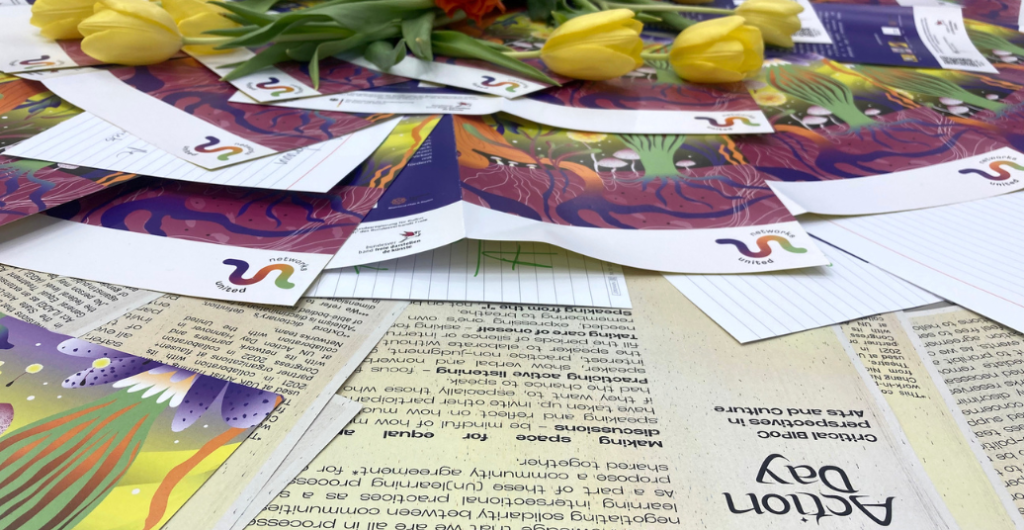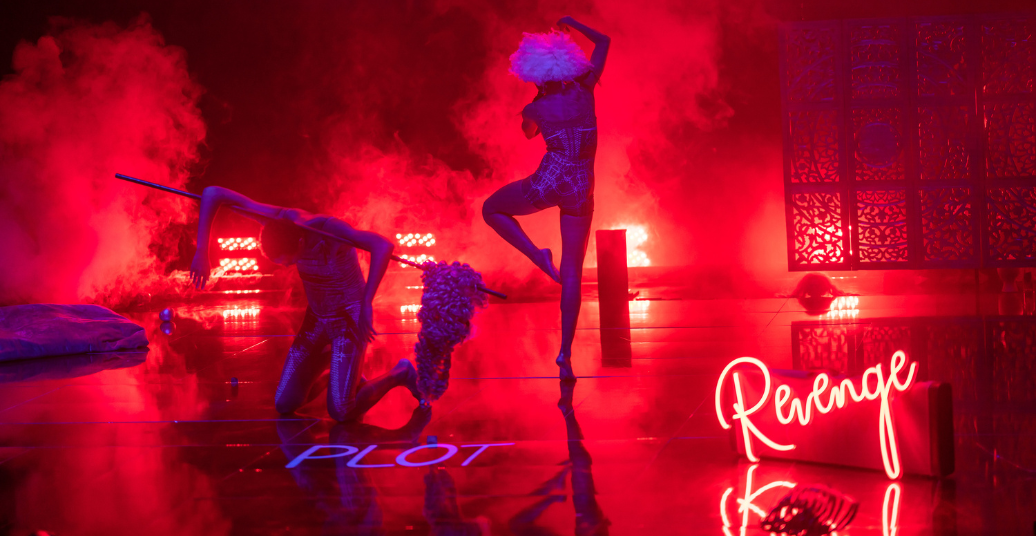Kathleen Heil (dance journalist) and Rachel Oidtmann (author / dancer) write alternately in their native languages English and German about the Tanzplattform Deutschland 2024.
The stage goes red. The word Revenge lights up in crimson neon. In a 70-minute performative installation, Ligia Lewis’s A Plot / A Scandal examines the legacy of slavery and colonialism in and on racialized bodies. A silver skull rolls about the stage, Lewis dons a wig and robe reminiscent of those worn by men in Enlightenment France, enjoys a freshly microwaved steak, the flesh a feast for the eyes and mouth, a body reduced to an object to be consumed. Pieces of wood set in the floor are displaced and moved about the stage, as if plots of land in the space. Lewis strips down and marks herself with white paint; invokes the rituals of her Dominican grandmother; a blue dress becomes a headdress resembling that of a Catholic nun; she roams the audience and points to a member of the crowd, as if condemned, or chosen.
The word Repair in neon was visible on the back wall of the stage, but left dark. At the end of the performance, the sign lit up in bright yellow for the first time, along with a yellow neon question mark at the other end of the stage, framing the performers. In A Plot / A Scandal, Lewis deconstructs the objectification of Black bodies and asks if dance can be an act of rebellion, a place of agency where oppressive plots might be transformed.
Can dance be an act of rebellion? How can trauma enacted on racialized bodies be repaired? These questions were carried forward by dance artists Pascale Baba Altenburger, Nora Amin, and Hanna Ma in the BIPOC Dance-Café, an interactive, dialogic format, part of Dance Across Triangular Borders – Processes of Decolonization in Contemporary Dance, a two-day panel program conceived and moderated by Sandra Chatterjee. We gathered at three tables to listen, ask questions, and exchange ideas.
Hannah Ma is the co-founder of United Networks gUG (UN), an alliance of six self-organized artist groups, community-focused platforms and networks from five German federal states, committed to the promotion of marginalized artists and thus to an equitable cultural landscape. Ma told us that this question from A Plot / A Scandal resonated, and asked: Is repair possible, especially within a capitalist structure that can induce a learned helplessness?

Ma proposed that antiracist work cannot be treated as an abstract intellectual concept, it has to come from the body, from a somatic place. I thought of Bojana Kunst’s words, from her 2015 book Artist at Work: Proximity of Art and Capitalism, which I will quote in full because it seemed to me that Ma created a shared space for exchange and transformation that embodied the kind of subversive pleasure Kunst describes: “Subversive pleasure comes from the distance that the dancing body has towards the institutional mechanisms of the exteriorization of movement, precisely because it can dance. In this sense the ability to move can resist the economic and social organization of the relational aspect of movement, and open up other embodied ways of moving together that continuously create flows of disturbances and affective persistence. This pleasure needs to be linked to the ability of everyday movement to induce change.”
We were surrounded by flowers and fliers proposing new ways of communication and detailing UN’s cultural work, we wrote the names of those not present we wished to invoke and call into presence, performed a movement ritual to come into connection with each other. Lara Kramer, a First Nations artist based in Montreal, proposed relationality as a means of repair, but emphasized that institutions need to approach this work meaningfully, first and foremost from within. As Chatterjee brought our session to a close, Ma shared with us the small pleasure of some sweets, and our three groups gathered as one for a photo.
As part of tanzschreiber@TPD24, a cooperation between Tanzbüro Berlin and the organizers of Tanzplattform Deutschland 2024 (dance department of Theater Freiburg), Rachel Oidtmann (author / dancer) and Kathleen Heil (dance journalist) accompanied the festival in writing. The Tanzplattform Deutschland 2024 took place from February 21-25, 2024 in Freiburg.




